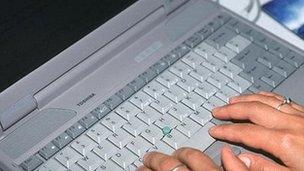CRB checks 'near 3m' says Big Brother Watch
- Published

Criminal record checks are used to research the background of individuals
Almost three million background checks were carried out on people in England and Wales last year, says privacy campaign group Big Brother Watch.
Some 2,981,958 checks were made in the 12 months to 18 December last year, with councils and firms were among more than 2,000 organisations making them.
Nick Pickles, of Big Brother Watch, said the checks sometimes wrongly branded innocent people as criminals.
Deputy Prime Minister Nick Clegg has said the system will be scaled back.
Last February he said an overhaul would mean only those working most closely with children or vulnerable adults will need to undergo the checks in the future.
The government said results will also be able to move with individuals when they change jobs, cutting down on bureaucracy.
It said it was time to return to a more "common sense" approach to background checks.
Results from a Freedom of Information Act request obtained by Big Brother Watch revealed that almost 60,000 checks were made by the Scout Association alone, making it one of the highest users.
The data obtained revealed that the extent to which councils used the system varied widely.
Essex County Council made nearly 22,000 checks while Wakefield Metropolitan Council made 877.
Private firms topped the list of those conducting checks, with Atlantic Data making 180,995 and Criminal Records Bureau (CRB) checking firm TMGCRB making 122,874.
Meanwhile, the Security Industry Authority, which manages the licensing of the private security industry, came third with 111,262 checks.
The Scout Association made 58,786 checks, the fifth highest number.
Big Brother Watch said the figures were "a sad indictment of a country that has lost all sight of proportion and has substituted common sense for a piece of paper".
Mr Pickles, the campaign group's director, said it was "remarkable" that nearly three million people had been checked in just one year.
He said: "Given just how many organisations now have access to the system, there is a clear risk that it is easy to delve into someone's private life and run a CRB check without them ever knowing.
'Fundamental reform'
"The checks have already been shown to wrongly brand innocent people as criminals and cost people their jobs for totally unrelated incidents that would not suggest they pose a risk.
"It's time to go back the drawing board and fundamentally reform the CRB system."
Plans to ease Criminal Records Bureau checks were outlined in the Protection of Freedoms Bill., external
It aims to scale back state powers and reverse what some perceive to be an erosion of civil liberties in recent years.
Referring to the changes, Home Office minister Lord Henley said: "What we are trying to do is create a system that will provide the necessary safeguards but does not make parents feel that their children are automatically safe - parents must still have the duty of looking after their children by warning them of potential dangers."
He also said schools and other organisations would be allowed to insist on CRB checks.
- Published9 February 2012
- Published11 February 2011